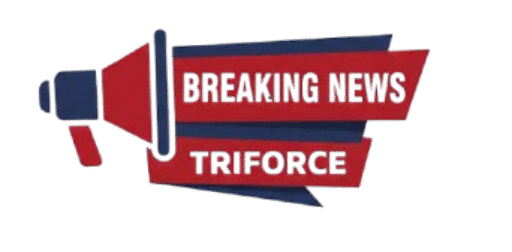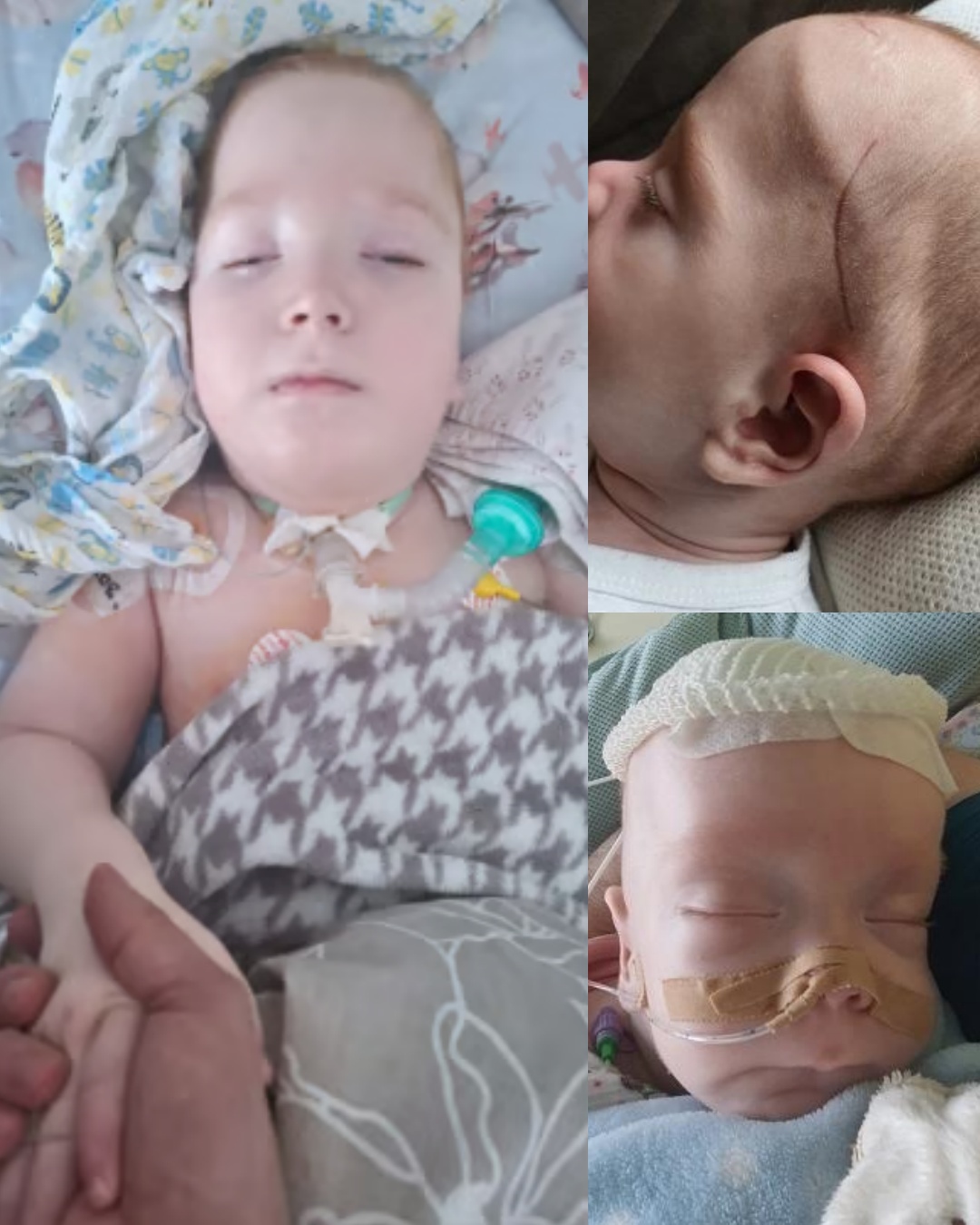For months now, we’ve been living in constant fear.
The kind that never lets you rest.
The kind that sits heavy in your chest, whispering questions you don’t want to hear:
Will tomorrow come? Will he still be here?Oskar is finally home now — after so many long, dark months in the hospital.
We treasure every second, every smile, every tiny moment spent together as a family.
Because deep down, we don’t know how long we’ll have these moments.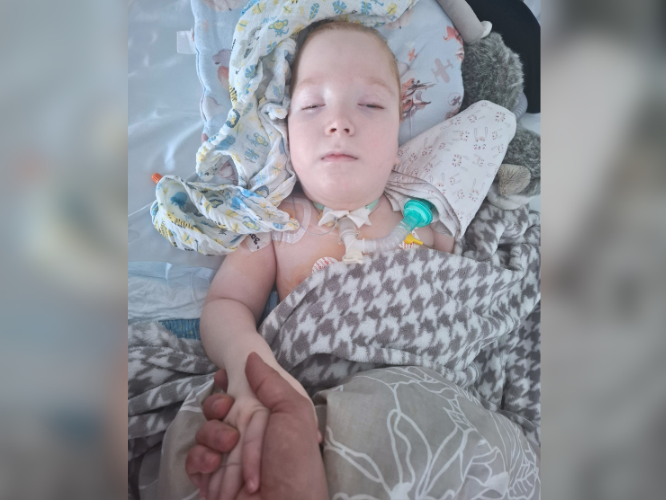
Our baby boy came into the world too soon — at just 36 weeks.
He was born with pneumonia.
We were frightened, of course, but we trusted the doctors. We counted the days until he could come home, until he could meet his big brother, until he could sleep in his own crib in the room we had lovingly prepared for him.But two weeks later, everything changed.
Two weeks after we dared to breathe, our world collapsed.
Oskar suffered a brain hemorrhage — bleeding in his tiny, fragile brain that led to
post-hemorrhagic hydrocephalus.
The words themselves felt unreal.
We didn’t understand at first, not fully. We only saw the looks on the doctors’ faces — the heaviness in their eyes, the careful tone in their voices when they said, “It’s serious.”Since that day, our lives have been a blur of pain, fear, and endless hospital corridors.
As if that weren’t enough, Oskar was diagnosed with a genetic blood-clotting disorder, meaning his blood doesn’t behave the way it should. What should heal becomes dangerous. What should protect can turn against him.
Every new diagnosis felt like another blow, another piece of our world breaking off.
One after another, the problems kept coming.
Oskar has battled pneumonia not once, not twice — but
three times.
He suffers from laryngeal flaccidity, which makes breathing and swallowing difficult.
Then came epilepsy, with seizures that left his small body trembling and us helpless to stop it.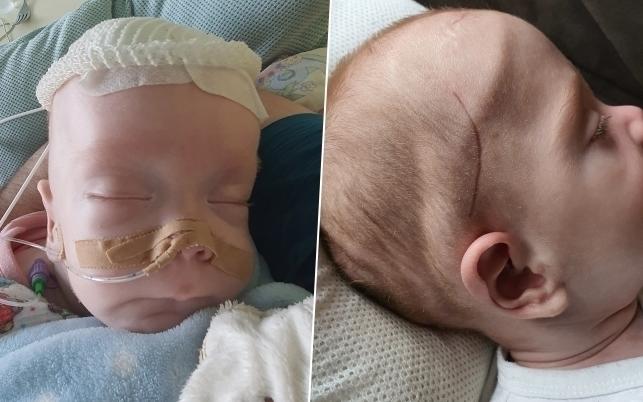
Feeding him became impossible. He couldn’t suck or swallow properly, so the doctors had to place a PEG tube, allowing him to be fed directly into his stomach.
Watching them do it — watching that tube become a lifeline — broke something inside us. But it was the only way to keep him alive.
Then came another cruel twist: Oskar is deaf in his right ear.
And now, doctors are unsure whether he can see at all.
No one can give us a clear answer.
We can only watch him, hold him, and hope that when his eyes move toward the light, he truly sees us.He spent nine months in the hospital.
Nine months of sterile rooms, beeping machines, and prayers whispered through tears.
During that time, he endured twelve surgeries — twelve times we signed our names, trembling, on consent forms, not knowing if we would ever see him awake again.Twelve times, we watched nurses carry our baby away on a stretcher, his tiny body swallowed by blankets, tubes, and wires.
Twelve times, we stood in hallways counting the seconds, the minutes, the eternity until someone finally emerged to tell us, “He’s alive.”Oskar’s body has been through more than any child’s should.
Because of an infection in his cerebrospinal fluid, his brain has suffered enormous damage.
CT scans and MRIs show severely enlarged ventricles and significant loss of brain tissue.
We can barely bring ourselves to look at the images.
How can something so small endure so much pain?And yet — he endures.
That’s what astonishes us most.
After everything, he’s still here.
Still fighting.
Still reminding us that miracles, even small ones, can exist inside the most fragile bodies.
But our fight is far from over.
Oskar needs intensive, ongoing rehabilitation and constant medical supervision from multiple specialists — neurologists, hematologists, orthopedists, audiologists, and physiotherapists.
Each appointment, each treatment, each medication comes with a price we can barely afford.
Our savings are disappearing faster than we can replenish them.
Every hospital trip, every dose, every sterile bandage or feeding supply chips away at what little we have left.
We try not to think about the future too much.
We live in the present — in the rhythm of feeding schedules, breathing checks, therapy sessions, and whispered prayers.
But when night falls, and the house grows quiet, the fear returns.
Will he breathe through the night?
Will he wake up tomorrow?
Will the next seizure take him from us?
It’s an unbearable kind of helplessness — the kind that gnaws at your soul and leaves you hollow.
But giving up isn’t an option.
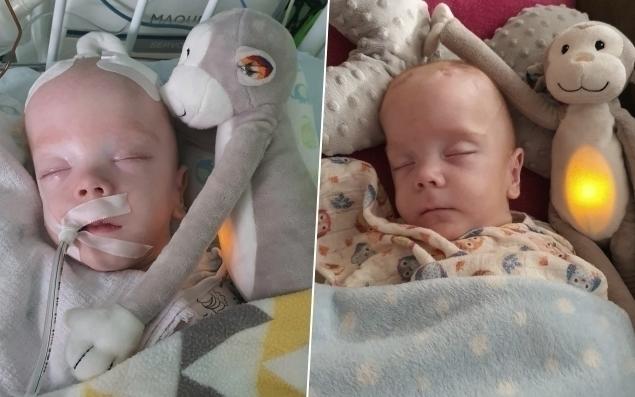
We love him too much to stop fighting.
We owe him every ounce of strength we have left.
He has already fought for his life countless times.
Now it’s our turn to fight for his future.
We want him to have the chance to experience life beyond hospital walls — to know sunlight, laughter, and the warmth of home without fear.
We want him to one day sit up on his own, to hear his brother’s laughter, to reach out and grab our hands — not because he needs help, but because he wants to.
For that to happen, Oskar needs specialized therapy, medical equipment, and ongoing care that can give his body the tools it needs to grow, heal, and rebuild.
Every coin, every bit of help, every shared word of support makes a difference.
Because right now, hope is all we have — and it’s slipping away faster than we can hold it.
When people see him, they often whisper, “He’s such a fighter.”
And he is.
But even the strongest fighter can’t stand alone.
We are reaching out — humbly, desperately — asking for help.
Not for ourselves.
For our son.
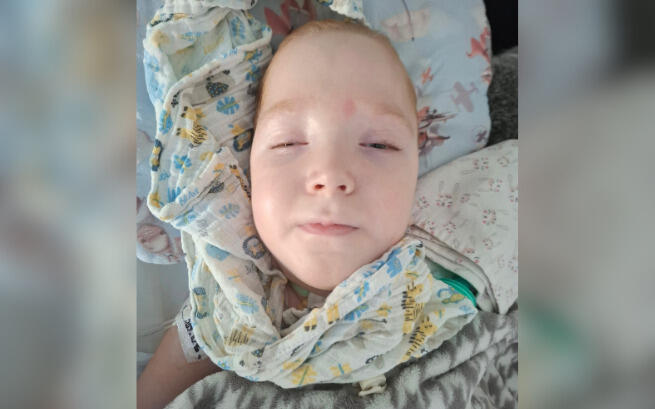
For Oskar, who has already endured more pain than most of us will ever know.
For the child who continues to fight, even when every breath hurts.
For the little boy who, despite it all, still reaches for our fingers with a fragile grip — a silent promise that he’s not giving up.
And neither will we.
From the bottom of our hearts, we thank everyone who stands with us — those who pray, donate, or simply care enough to read his story.
Your support means more than words can ever say.
Please, stay with us.
Help us keep fighting.
Because every small act of kindness brings us closer to one more day — one more breath — one more smile from our brave little boy.
When Officers Chose Compassion Over Duty.780
It was supposed to be just another evening on patrol. The streets were quiet, the kind of quiet officers often welcomed after long shifts of responding to emergencies. Nothing unusual, nothing urgent — until two officers noticed a young man biking hard through a quiet neighborhood.
His bike was old, the kind that squeaked with every push of the pedals. His backpack was worn, straps fraying from use. His face was young but lined with focus, determination, and maybe a hint of exhaustion.
For a moment, the officers almost kept driving. He wasn’t breaking any laws. He wasn’t disturbing anyone. But something about the way he rode caught their attention — fast, urgent, with a kind of weight that didn’t belong to a simple evening ride. Something told them to stop.
When they spoke to him, the truth unfolded. The bike wasn’t even his. He had rented it from a friend. Not for leisure. Not for fun. But because it was the only way he could make deliveries to support his family.
Both he and his wife were out of work. They had a baby at home. No car to get around. No steady income to rely on. And yet, here he was, refusing to complain, refusing to give up — pedaling through the night, determined to keep food on the table.
The officers didn’t arrest him. They didn’t lecture him. They simply listened. And as they drove away, they couldn’t shake the conversation. His humility, his quiet fight to survive, stayed with them.

Most days, police officers move from call to call, rarely able to linger on the lives of those they encounter. But this young man’s story lodged itself in their hearts. They decided to do something different. Something rare.
They shared his story — carefully, respectfully — with members of the community. No names, no details that would embarrass him. Just the truth: a young father was doing everything in his power to provide for his family, and he needed a little help.
The response was overwhelming. Strangers, neighbors, and local businesses all wanted to pitch in. A few days later, the officers arranged to meet the young man again. But this time, it wasn’t for questioning.
This time, it was to give.
Waiting for him was a brand-new bicycle, sturdy and reliable. Alongside it were a helmet, a lock, and several handwritten notes of encouragement from people he had never met.
At first, he didn’t understand. Then realization dawned. And when it did, he broke down.
Not because the bike was expensive. But because it was more than just a bike. It was proof that someone had noticed his struggle. That someone cared enough to act. That he wasn’t invisible.
That simple gift didn’t make the news. It wasn’t broadcast on television or written into headlines. But for one young father doing everything he could to survive, it meant the world.
Because sometimes, the smallest acts — the ones no one sees — are the ones that go the farthest.
